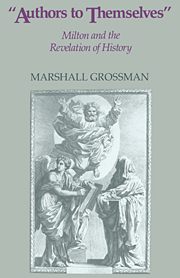3 - Effulgent Glory
Published online by Cambridge University Press: 23 October 2009
Summary
THE NARRATIVE LINE OF PARADISE LOST rises inexorably toward the dramatic climax of man's “first disobedience.” The first two books explicate the immediate cause of the fatal act that is to come – the displaced resentment of Satan and his plan to attack God through his creation. A complex rhetoric of feeling participates in this exposition, sometimes reinforcing, sometimes challenging the narrator's interpretation of the action. This implicit development adds to the dramatic logic of the events leading up to the temptation – the background of Satan's fall and the beginning of his journey to Eden – a sensual apprehension of the “dismal Situation” of the damned. The force of the apocalyptic vision in Book III depends upon the contrast between its underlying rhetorical patterns and those of the first two books. The pattern of frustrated hypotheses that characterized the discourse of hell is familiar in man's fallen experience, a fact Milton implies when his proleptic similes project the devils into human history. The temporal sequence asserted is one in which the reader is expected to recognize what has become familiar in human history as descending from an infernal original. He or she is to know hell by its family resemblance to the fallen world and to understand the fallen world through its relationship to hell.
The presentation of human time in relation to an eternal heaven in Book III is a more difficult poetic problem, for eternity is static and therefore more suited to description than narration.
- Type
- Chapter
- Information
- Authors to ThemselvesMilton and the Revelation of History, pp. 48 - 67Publisher: Cambridge University PressPrint publication year: 1988



